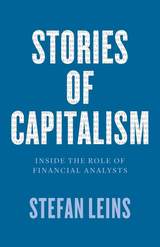
Investment banks play a critically important role in channeling capital from investors to corporations. Not only do they float and distribute new corporate securities, they also assist companies in the private placement of securities, arrange mergers and acquisitions, devise specialized financing, and provide other corporate financial services.
After sketching the history and evolution of investment banking, the authors describe the structure of the industry, focusing on the competitive forces at work within it today. They explore patterns of concentration and analyze the strategic and economic factors that underlie those patterns. The authors directly examine the pairing up of investment banks with their corporate clients. They show that the market is sharply segmented, with banks and corporate clients being matched in roughly rank order, the most prestigious banks with the largest, most powerful clients, and so on. Vigorous competition occurs within each segment, but much less between them.
With the industry now confronting a changing regulatory environment, a growing tendency of clients to arrange their own financing, and increasing competition both from within and from commercial banks and foreign institutions, Competition in the Investment Banking Industry is essential reading for anyone interested in the future of investment banking.


Ho, who worked at an investment bank herself, argues that bankers’ approaches to financial markets and corporate America are inseparable from the structures and strategies of their workplaces. Her ethnographic analysis of those workplaces is filled with the voices of stressed first-year associates, overworked and alienated analysts, undergraduates eager to be hired, and seasoned managing directors. Recruited from elite universities as “the best and the brightest,” investment bankers are socialized into a world of high risk and high reward. They are paid handsomely, with the understanding that they may be let go at any time. Their workplace culture and networks of privilege create the perception that job insecurity builds character, and employee liquidity results in smart, efficient business. Based on this culture of liquidity and compensation practices tied to profligate deal-making, Wall Street investment bankers reshape corporate America in their own image. Their mission is the creation of shareholder value, but Ho demonstrates that their practices and assumptions often produce crises instead. By connecting the values and actions of investment bankers to the construction of markets and the restructuring of U.S. corporations, Liquidated reveals the particular culture of Wall Street often obscured by triumphalist readings of capitalist globalization.

Building on recent developments in the social studies of finance, Stories of Capitalism provides the first ethnography of financial analysis. Drawing on two years of fieldwork in a Swiss bank, Stefan Leins argues that financial analysts construct stories of possible economic futures, presenting them as coherent and grounded in expert research and analysis. In so doing, they establish a role for themselves—not necessarily by laying bare empirically verifiable trends but rather by presenting the market as something that makes sense and is worth investing in. Stories of Capitalism is a nuanced look at how banks continue to boost investment—even in unstable markets—and a rare insider’s look into the often opaque financial practices that shape the global economy.
READERS
Browse our collection.
PUBLISHERS
See BiblioVault's publisher services.
STUDENT SERVICES
Files for college accessibility offices.
UChicago Accessibility Resources
home | accessibility | search | about | contact us
BiblioVault ® 2001 - 2024
The University of Chicago Press









